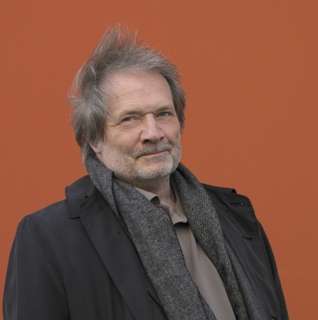|
Back
Focus on Eötvös Los Angeles
Walt Disney Concert Hall
03/09/2010 -
Vykintas Baltakas: (co)ro(na)
Peter Eötvös: Snatches of a Conversation – Korrespondenz – Sonata per Sei
Brandon Ridenour (trumpet), Timur Bekbosunov (speaker), Calder Quartet: Benjamin Jacobsen (violin), Andrew Bulbrook (violin), Jonathan Moerschel (viola), Eric Byers (cello)
Los Angeles Philharmonic New Music Group, Gregory Vajda (conductor)

P. Eötvös (© Priska Ketterer)
This performance was shockingly pleasurable. It was beautiful and thorny, but it was also simply accessible. The program appeared to be challenging bristly music coming out of a tradition of off-putting thorniness.
There is so much background information on this music, a huge amount to learn, if you so desire. If you read too much about it you almost would not want to go. It would seem bitter medicine that is good for you because it is high art and intensely intellectual, an “acquired taste”.
But it is all so unnecessary, if you just sit down and enjoy it with open ears. For such complex contemporary music, this aspect of the evening reveals the excellence of both the composition and the performers.
It will be fascinating to compare this exceptional ensemble, The LA Philharmonic New Music Group, to the legendary Ensemble Modern that will be resident at the nearby Ojai Festival this summer. The Calder Quartet was also superb. They seemed to play with no preconceptions at all, no habits of performance, no tricks from their tool bag to draw on, because the music felt utterly new.
From the beginning, the opening piece by Vykintas Baltakas, a student of Eötvös, made spiky modernity playful and attractive, like the paintings of Joan Miró or Paul Klee. The piece was entirely serious but brightly colored and fluid, with instrumentation including the flute, oboe, clarinet, saxophone, horn, piccolo trumpet, piano, accordion, violin and percussion. The music leaped about sonically, a blustery and violent scherzo. It had some of the charm of Janacek in his strikingly pleasurable melodic pieces, like the Sinfonietta. But it was always ferocious. This was the perfect performance, under conductor Gregory Vajda, to attract listeners usually put off by this kind of music. Vajda replaced the Associate Conductor Lionel Bringuier, who suffered a recent injury.
Despite his stocky frame and stiff arms, Vajda proved intensely musical with fluid hands, utterly steeped in the repertoire. He was a contradiction and surprise: a graceful Slavic shot putter of a conductor. For this concert, no one could have been better. Eötvös Snatches offered the most difficult point of entry, as if it were music for Japanese Noh Theater composed by an Eastern European. But it also sprang from somewhere between Bartok and Spectralism, transparently compelling, stark, bright and dark.
The dual-belled trumpet, athletically maneuvered by Brandon Ritenour seemed mostly odd. The narration by speaker Timur Bekbosunov: “Its just a small scratch… Sound check, sound check,” was practically meaningless but filled with innuendo. These whispers and overheard snatches of dialogue often turn out badly, but here it was successful. This kind of language, heavily influenced by T.S. Eliot and the French poetry that influenced him, was effective but unnecessary. The other instruments were alto flute, clarinet, trombone, tenor sax, percussion, violins, viola, cello, double bass and sampler.
Eötvös’ string quartet Korrespondenz also has a massive complex of programmatic information beneath it. The piece is based on letters between Mozart and his father, with the cello representing Leopold and the viola as Wolfgang. But it almost seems that this “back-story” is a distraction for the listener, who may not need to know about it at all. This can be seen as parallel to the argument that T.S. Eliot’s explanatory footnotes to the “The Wasteland” are a deliberate gesture, to distract the reader from the actual thrust of the poem. When Eötvös’ strategy is so complex, including the written text of the correspondence above the notes on the score, it is a little amazing that it matters so little for the listener.
But undoubtedly, this elaborate compositional technique affects the performers approach to the score. At least in these performances, the pieces without spoken language were more intensely musical and somehow more moving. The Calder Quartet poured intention into every measure, every bar and every note. It was as if they had studied and analyzed the music, and then decided how to interpret each iota of sound. Far beyond a typical “reading,” this is not what you usually hear in a performance of this modern a piece. Often it is amazing that a group can even play the damn thing, learn it and get through it, it being so damn hard.
We can hope that the Calders will play this music over and over again. They must have poured hours and hours into it; they should record it. It has the potential to match the intensity of their performances of Christopher Rouse.
The final piece was also the best, rivaling the string quartet. A concerto for two pianos reduced to a chamber piece including percussion and sampler, Sonata Per Sei takes its inspiration from Bartók. Pianists Mark Robson and Bryan Pezzone fluidly faced off over the two lidless instruments, with keyboardist Danny Holt behind them on the sampler. The percussion was divided in two sections on each side of the stage. The setup was curious, but the performance was completely natural and approachable, creating a transparent musical universe.
The sounds of the three keyboards often overlapped, and there seemed to be a clear overall architecture, perhaps inspired by Rem Koolhaas. There were also jumbles of notes that felt like children of Shostakovich, but less acidic.
This was an evening that might be great at place like (Le) Poisson Rouge in NYC. But the quartet would have suffered from amplification. And the gorgeous acoustic in Disney Hall offered an ideal deep and austere clarity. Eötvös himself came up onstage at the end and seemed as thrilled as the audience was.
Thomas Aujero Small
|